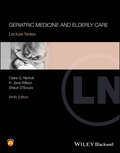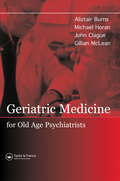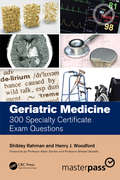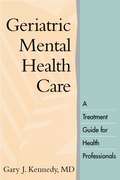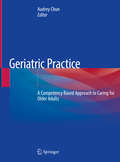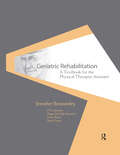- Table View
- List View
Geriatric Gastroenterology
by T. Dharmarajan C. S. PitchumoniAs aging trends in the United States and Europe in particular are strongly suggestive of increasingly older society, it would be prudent for health care providers to better prepare for such changes. By including physiology, disease, nutrition, pharmacology, pathology, radiology and other relevant associated topics, Geriatric Gastroenterology fills the void in the literature for a volume devoted specifically to gastrointestinal illness in the elderly. This unique volume includes provision of training for current and future generations of physicians to deal with the health problems of older adults. It will also serve as a comprehensive guide to practicing physicians for ease of reference. Relevant to the geriatric age group, the volume covers epidemiology, physiology of aging, gastrointestinal physiology, pharmacology, radiology, pathology, motility disorders, luminal disorders, hepato-biliary disease, systemic manifestations, neoplastic disorders, gastrointestinal bleeding, cancer and medication related interactions and adverse events, all extremely common in older adults; these are often hard to evaluate and judge, especially considering the complex aging physiology. All have become important components of modern medicine. Special emphasis is be given to nutrition and related disorders. Capsule endoscopy and its utility in the geriatric population is also covered. Presented in simple, easy to read style, the volume includes numerous tables, figures and key points enabling ease of understanding. Chapters on imaging and pathology are profusely illustrated. All chapters are written by specialists and include up to date scientific information. Geriatric Gastroenterology is of great utility to residents in internal medicine, fellows in gastroenterology and geriatric medicine as well as gastroenterologists, geriatricians and practicing physicians including primary care physicians caring for older adults.
Geriatric Hip Fractures: A Practical Approach
by Nicholas C. Danford Justin K. Greisberg Charles M. Jobin Melvin P. Rosenwasser Marcella D. WalkerThe global burden of geriatric hip fractures is enormous. From both the patient's and physician’s perspective, the injury is complex. A hip fracture often changes a patient’s life and/or the life of the patient’s family permanently. From the physician’s perspective, care of geriatric hip fracture patients requires a multidisciplinary team, which is led by the surgeon and which includes internists and other subspecialists within internal medicine, anesthesiologists, nurses, operating room technicians, social workers, physical therapists, and rehabilitation center coordinators and staff. Nowhere in the orthopedic literature is there a text that guides care for these complex patients from injury through recovery. This text is the first to do so by organizing and synthesizing a large body of literature. Its main themes include pre-operative, operative, and post-operative care of the patient who sustains a geriatric hip fracture. Its main objective is to organize the current body of literature into a cohesive whole so that the busy orthopedic surgeon does not have to undertake a literature search each time he or she wants an answer to the myriad questions that characterize a patient’s injury, treatment, and recovery course. With regard to pedagogy, because orthopedic surgeons in training will utilize this book, and because the case study is the central pedagogical tool in the field of orthopedic surgery, this book includes case studies within each chapter, with the author’s preferred treatment and decision-making rationale for each case. Selected video supplements reinforce real-world application of knowledge.Practicing orthopedic surgeons, as well as orthopedic residents and fellows in training, will find Geriatric Hip Fractures: A Practical Approach a highly useful and informative resource.
Geriatric Home-Based Medical Care
by Jennifer L. Hayashi Bruce LeffThis book is a practical reference for any clinician who has struggled to care for an older adult in a home setting. The volume is written by experts in the field who describe fundamental principles and clinical approaches of geriatric home-based care and their application to specific diseases and conditions, including delirium, incontinence, falls, and chronic pain and disability. The book also details house calls for special populations, from the developmentally disabled to those afflicted with neurologic or psychiatric diseases. The volume explores house calls within the context of the US healthcare system. Geriatric Home-Based Medical Care: Principles and Practice is a valuable resource for geriatricians, geriatric nurses, primary care physicians, social workers, public health officials, and all medical professions who need tools to provide timely, compassionate, and high-quality care for their older adult patients.
Geriatric Home-Based Medical Care: Principles and Practice
by Bruce Leff Jessica L. Colburn Mattan Schuchman Mariah L. RobertsonOlder adults are living longer with more chronic disease and functional impairment than at any other time in history. Office-based practice is inadequate to meet the needs of patients who have difficulty leaving their homes for routine or urgent visits, and health care clinicians must choose between trying to manage their problems via telehealth or sending them to the emergency room via ambulance. Indeed, many clinicians receive little or no training in home-based medical care and are unable to consider a home visit that might avert a health crisis or an emergency room visit. Other clinicians know that house calls are possible but may not know how to work them into day-to-day practice. In recent years, a growing number of clinicians have focused their practice on home-based medical care to meet the rising need. In fact, there has been a substantial increase in house calls provided to Medicare beneficiaries. In 2023, over 750,000 traditional Medicare beneficiaries, and in 2022, over 680,000 Medicare Advantage beneficiaries received longitudinal home-based medical care. While the number of house calls has increased rapidly, the number of clinicians providing those visits has markedly decreased, suggesting that clinicians who are providing such care are making it the sole focus of their practice. This book is intended to be a practical reference for any clinician who has struggled to care for an older adult who has difficulty getting to the office. By describing fundamental principles of geriatric house call medicine and application to specific diseases and conditions, we hope to provide clinicians with the tools they need to provide timely, compassionate, and high-quality care for their older adult patients. The second edition has been updated to reflect changes in the healthcare system and approaches to care since the publication of the first edition.
Geriatric Imaging
by Ali Guermazi Giuseppe Guglielmi Wilfred C. PehIn the elderly, the coexistence of various diseases, the presence of involutional and degenerative changes, and the occurrence of both physical and cognitive problems represent "the norm." It is therefore important to know how to distinguish the healthy elderly from those in need of treatment as a sound basis for avoiding overdiagnosis and overtreatment. This aspect is a central theme in Geriatric Imaging, which covers a wide range of applications of different imaging techniques and clearly explains both the potential and the limitations of diagnostic imaging in geriatric patients. Individual sections are devoted to each major region or system of the body, and a concluding section focuses specifically on interventional procedures. The book, written by recognized experts in the field, is superbly illustrated and will be an ideal resource for geriatricians, radiologists, and trainees.
Geriatric Medicine
by Balakrishnan Kichu R. NairWritten by international experts, this book presents chapters that cover common geriatric conditions including dementia, depression, delirium, falls, polypharmacy, incontinence, immobility, and medication-related issues, as well as neurological, cardiovascular, and endocrine diseases associated with old age. The book also discusses various aspects of ambulatory, residential, and palliative care for the elderly, in addition to ethical aspects of old age care, advance care planning and living wills. Geriatric medicine is a rapidly growing field in internal medicine. The majority of elderly people now live in developing countries, where there is an urgent need to up-skill healthcare professionals. By presenting problems as they arise and then discussing how to solve them, this book offers a valuable resource for all physicians interested in the care of older people.
Geriatric Medicine and Elderly Care: Lecture Notes (Lecture Notes)
by K. Jane Wilson Claire G. Nicholl Shaun D'SouzaGERIATRIC MEDICINE AND ELDERLY CARE Lecture Notes Ninth Edition An essential resource for meeting the needs of an ageing patient population As the global population ages, geriatric medicine is steadily becoming one of the most important areas of medical research and care. Healthcare systems in developed countries are adapting to this shift in the population, and doctors are finding that a larger and larger proportion of their patients are older. Current medical training often does not include adequate coverage of geriatric medicine, and students may well find they require more extensive resources for meeting older patients’ needs. Lecture Notes: Geriatric Medicine and Elderly Care meets this need with a set of comprehensive but straightforward introductions to the foundational concepts of geriatric medicine. Combining a user-friendly format with extensive high-quality figures and illustrations, it is a must-have resource for medical students looking to deepen their knowledge of a widening area of essential care. Now thoroughly revised and updated to reflect the latest research and medical knowledge of ageing and elder care, this is an essential contribution to the popular Lecture Notes series. Readers of the ninth edition of Lecture Notes: Geriatric Medicine and Elderly Care will also find: New chapters on the ‘science of ageing’ including immunosenescence and rejuvenation research, and geriatric oncologyFull coverage of the British Geriatrics Society and European undergraduate curriculumsA companion website with appendices, key revision points for each chapter and further readings Lecture Notes: Geriatric Medicine and Elderly Care is ideal for medical students and Foundation Year doctors in most specialties who are treating frail older people. It also provides a starting point for revision for higher specialty examinations in geriatric medicine. Anki Revision Cards A set of ‘Anki App’ digital revision cards is available to go with this textbook. The cards contain the material from the self-test questions in the book. Anki App is a cross-platform mobile and desktop flashcard app that can support your studies (see www.ankiapp.com). It uses an algorithm to present cards you know less well more frequently. You can keep the cards on your mobile device and study them in your downtime. Visit www.lecturenoteseries/paediatrics to download the card set to your device.
Geriatric Medicine for Old-Age Psychiatrists
by Alistair Burns Michael HoranThis up-to-date digest of current medical problems will aid the reader in interpretation of investigations, which are increasingly requested. It provides guidance for the first line of management of patients. It is written primarily by an experienced geriatrician, informed by an old-age psychiatrist; a unique combination of author perspectives that
Geriatric Medicine: 300 Specialty Certificate Exam Questions (MasterPass)
by Shibley Rahman Henry J. WoodfordThis book is an authoritative and well-structured text which is both topic and curriculum oriented, aimed to appeal to a wider multi-professional audience in line with the current NHS workforce training needs in the UK. It is based on the ‘specialist certificate examination’ (SCE), awarded for the completion of higher specialist training. Following closely the published blueprint from the Royal College of Physicians, and the curriculum from JRCPTB, it provides an up-to-date bank of revision material. These 300 questions in the ‘single best answer’ (SBA) format (like the actual assessment), are complete with comprehensive, well-evidenced explanations and explanatory further reading material. Key Features Maps the entire curriculum covered on the geriatric specialization exam Addresses the gap in the market to educate on the core curriculum for the busy professionals and post graduate medical trainees working towards this examination The book is thematically organized to make it an accessible quick reference for also those not planning to take the exam but seeking to broaden and deepen their own knowledge base
Geriatric Medicine: A Person Centered Evidence Based Approach
by Matteo Cesari Michael R. Wasserman Debra Bakerjian Sunny Linnebur Sharon Brangman Sonja RosenOlder adults represent the most rapidly growing demographic in the U.S. and in many developed countries around the world. The field of geriatric medicine is still relatively young, and is only recently seeing a significant increase in peer reviewed literature. Medicare and Medicaid expenditures related to older adults are nearly a trillion dollars/year in the US. How our healthcare system cares for older adults, and how those older adults navigate an increasingly complex system, is of the utmost importance. According to the Institute of Medicine, physicians and other healthcare professionals receive an inadequate amount of training in geriatric medicine. Geriatric medicine is based on the concept of delivering person centered care with a focus on function and quality of life. It is essential that physicians, nurse practitioners, physician assistants, pharmacists, social workers and other health care professionals all be knowledgeable about the geriatric approach to care.Geriatric medicine varies from most other fields in medicine. While many specialties function on the basis of evidence-based literature, geriatricians and other clinicians caring for older adults must integrate relatively limited evidence with variable physiological changes and complex psychosocial determinants. Geriatricians are used to caring for 90 year olds with multiple chronic illnesses. Their variable physiology leads to uncertain responses to pharmacotherapy, and their personal goals and wishes need to be incorporated into any plan of care. Practicing geriatric medicine requires the ability to see patterns. But it goes one step further, as the rules are constantly in flux. Every patient is an individual with particular needs and goals. In order to provide true person centered care to older adults, one has to incorporate these factors into the decision making process. The proposed handbook is designed to present a comprehensive and state-of the-art update that incorporates existing literature with clinical experience. Basic science and the physiology of aging create a background, but are not the main focus. This is because every chapter has been written through the lens of “person centered care.” This book is about focusing on what matters to the person, and how that is not always about pathology and physiology. The reader generally will not find simple solutions to symptoms, diseases and syndromes. In fact, the key to caring for geriatric patients is the ability to think both critically and divergently at the same time. Geriatrics encompasses multiple disciplines and spans all of the subspecialties. It requires knowledge of working within an interdisciplinary team. It requires an appreciation of how quality of life varies with each individual and creates treatment and care plans that also vary. And most of all, it requires a firm commitment to first learning who the person is so that all of the necessary data can be analyzed and integrated into a true person centered plan of care. This book aims to serve as an unparalleled resource for meeting these challenges. Updated and revised from the previous edition, this text features over 40 new peer-reviewed chapters, new references, and a wide array of useful new tools that are updated on a regular basis by interdisciplinary and interprofessional experts in geriatric medicine.
Geriatric Mental Health Care
by Gary J. KennedyThis essential guide is designed for mental health practitioners and primary care providers without advanced training in geriatric psychiatry. Leading physician and educator Gary J. Kennedy sets forth a clear framework for understanding the interplay of medical, psychological, and social factors in frequently encountered problems among older adults. Clear guidelines are delineated for assessing and treating such conditions as depression and anxiety, dementia, psychosis and mania, sleep disturbances, personality and somatoform disorders, substance abuse, and suicidality. Throughout, Kennedy focuses on ways to sustain seniors' independence and overall quality of life while enhancing their adaptive capacities. Psychopharmacological principles are presented with an emphasis on safety, simplicity, and effectiveness, and the beneficial applications of individual, marital, family, and group psychotherapies are also addressed. Other topics covered include sexuality in old age, problems of elder abuse and neglect, collaborating with family members and other caregivers in medical and nonmedical settings, and legal and ethical issues in treatment.
Geriatric Neurology
by Anil K. Nair Marwan N. SabbaghAging affects neurological function leading to neurological diseaseAs society grows older, so do the neurological problems associated with aging. These can be new neurological deficits due to the aging process itself, or the effect of aging on already existing neurological conditions. Neurologists will spend increasing amounts of time managing patients with age-related neurological complications.Geriatric Neurology brings together the wisdom of world-leading experts. They have crafted a new textbook to define this emerging subspecialty from basic science through clinical assessment and medical management to social aspects of patient care. Geriatric Neurology covers:The aging brain in neurologyAssessment of the geriatric neurology patientNeurological conditions in the elderlyTherapeutics for the geriatric neurology patientManagement issues beyond therapeuticsComprehensive in scope but with practical focus for effective patient care, Geriatric Neurology provides top-of-class guidance for the management of elderly patients with neurological disorders.
Geriatric Nutrition
by John E. Morley David R. ThomasIn a vicious cycle, poor nutritional health leads to acute and chronic disease, and disease states are catastrophic to nutritional health. The magnitude of nutritional depletion from any cause depends to a large extent on the nutritional reserves an individual has accumulated over time. In our increasingly older population, nutritional reserves are
Geriatric Oncology
by Arti Hurria Lodovico BalducciThe management of the older person with cancer is based on the estimate of life expectancy, tolerance of treatment, patient preference, and socio-economic barriers to treatment. The thrust of this book is to make medical oncologists and other health professionals managing older patients with cancer aware of recent developments in geriatric assessment and in cancer management for the older adult. After consulting this text the practitioner will be able to provide individualized treatment to the older cancer patient, reflecting that patient's physiologic age and personal needs. This book will also provide a scaffold to organize rapidly developing advances in geriatric assessment. This is particularly relevant for practitioners of oncology since the majority of patients with cancer are 65 and older. The target audiences for this book are oncologists of all specialties, oncology nurses, primary care physicians, geriatricians, and all other health professionals involved in the management of older patients with cancer.
Geriatric Ophthalmology
by Hilary A. Beaver Andrew G. LeeAs the Baby Boom generation ages, an increased need for geriatric specialty care becomes particularly important. This shift will especially affect ophthalmology, as the occurrence of common visual disorders such as cataracts, macular degeneration, glaucoma and diabetic retinopathy increases with age. This book anticipates this pending and inevitable demographic shift and fulfills the need for a practical, "bread-and-butter" approach to Geriatric Ophthalmology.
Geriatric Ophthalmology: A Competency-based Approach
by Hilary A. Beaver Andrew G. LeeGeriatric patients have unique responses to treatment and disease, often harboring co-morbidities that can impact evaluation, treatment, and prognosis, which can require specialized expertise or experience. Geriatric Ophthalmology, Second Edition draws upon the successful first edition by applying a competency-based approach to these patients, improving awareness, increasing understanding, and encouraging expertise about geriatric issues among eye care professionals. <P><P> These intersecting conditions and their treatment are comprehensively discussed in this fully updated second edition, complete with additional high-quality illustrations and photos. Each chapter utilizes illustrative cases to exemplify the points of care encompassed by the competencies. Topics of special interest are included, such as diabetic retinopathy, age-related macular degeneration, cataracts, glaucoma, diabetic retinopathy, low vision, all diseases of aging, and the effect of vision loss on the geriatric patient’s quality of life. Medical students, residents, fellows, clinicians, and allied health personnel alike will find this to be a comprehensive resource and exceptional guide to the care of older patients with geriatric ophthalmology problems.
Geriatric Practice: A Competency Based Approach to Caring for Older Adults
by Audrey ChunThis book serves as a comprehensive reference for the basic principles of caring for older adults, directly corresponding to the key competencies for medical student and residents. These competencies are covered in 10 sections, each with chapters that target the skills and knowledge necessary for achieving competency. Each of the 45 chapters follow a consistent format for ease of use, beginning with an introduction to the associated competency and concluding with the most salient points for mastery. Chapters also includes brief cases to provide context to the clinical reasoning behind the competency, strengthening the core understanding necessary to physicians of the future. Written by expert educators and clinicians in geriatric medicine, Geriatric Practice is key resource for students in geriatric medicine, family and internal medicine, specialties, hospice and nursing home training, and all clinicians studying to work with aging patients.
Geriatric Psychiatry Review and Exam Preparation Guide: A Case-Based Approach
by Andrew Wiens Dallas Seitz Evan Lilly Mark RapoportGeriatric psychiatry is a relatively young discipline within the field of North American psychiatry. The development of a workforce to meet the needs of an aging population has been identified as an urgent priority, but there is still much we don’t know about fulfilling the mental health needs of older adults. For Mark J. Rapoport, geriatric psychiatrists must assess and treat patients today in face of the limitations of what we know, but also be armed with enthusiasm to create novel ways of impacting on the quality of life of older patients with mental illness. The chapters in this book include case scenarios, concise point-form summaries of diagnostic and treatment approaches, up-to-date evidence syntheses, discussions of controversies, and a series of practical and thought-provoking questions and answers. Geriatric Psychiatry is a succinct and advanced review of geriatric psychiatry that will help clinicians improve the psychiatric care of an aging population.
Geriatric Psychiatry Study Guide: Mastering The Competencies
by James A. Bourgeois Julie Young Ana Hategan Tracy ChengTrainees in subspecialty of geriatric psychiatry and general psychiatry need to master core competencies in geriatric psychiatry in order to practice. This book is designed to provide short-answer question-based learning centering around the core curriculum topics in geriatric psychiatry and is primarily ideal not only for medical students, residents, and fellows, but also for psychiatrists preparing for re-certification. This book features approximately 300 short-answer questions on geriatric psychiatry topics, each comprising the stem of a brief clinical scenario or concise question with expected number of answers. The book also features detailed teaching notes, graphics, and the respective source references. The format is consistently structured from chapter to chapter, practical and concise, and designed to enhance the reader’s diagnostic and management ability and clinical understanding. Each answer includes a concise discussion, pertinent illustrations, and source references. This text is a valuable reference and teaching tool that provides an opportunity for learning across a rapidly growing field. The material covered matches the existing postgraduate curricula in geriatric psychiatry and helps prepare candidates for their specialty and subspecialty certification examinations. The cases map well to both the American Geriatric Psychiatry Association and Canadian Academy of Geriatric Psychiatry as well as other international postgraduate curricula. The book covers main topics within geriatric psychiatry, some such as substance use disorders and sexuality and sexual dysfunction in later life. As the Baby Boomers age, this reference will continue to be a valuable staple in geriatric workforce training. Geriatric Psychiatry Study Guide is the ultimate resource for students, residents, fellows, psychiatrists, psychologists, family practitioners, nurses, social workers, and all clinicians rising to the challenges of the mental health segment of the geriatric workforce.
Geriatric Psychiatry in South Asia: Current Status and Ways Ahead (South Asian Perspectives in Mental Health and Psychology)
by S. M. Yasir Arafat Sujita Kumar Kar Nilamadhab KarThis book is about the current status and ways ahead of geriatric psychiatry in South Asia. South Asia is home to a large proportion of the world&’s elderly. With improved longevity, the geriatric population is increasing fast in recent years in South Asian countries. Along with this, the mental health burden of the older adults is increasing. However, mental health care of older adults in South Asia is a neglected area. Little is known about the burden of mental disorders and available mental health services specific for the older adults population in South Asia and other low and middle income countries. It is well known that resources are fewer in this region, and most of the older adults in these areas are not recognized or treated. There is a urgent need to explore the services available, their appropriateness and effectiveness, and to reflect on the region-specific, economically viable solutions that can be adapted soon. The book discusses how these services can be seamlessly integrated to the existing support systems. Besides the interventional aspects, the book also explores the facilitating and impeding factors of implementing evidence-based preventive efforts in these countries.
Geriatric Psychiatry: A Case-Based Textbook
by James A. Bourgeois Ana Hategan Calvin H. Hirsch Caroline GirouxThis textbook presents real-world cases and discussions that introduce the various psychiatric syndromes found in the aging population before delving into the core concepts covered by geriatric psychiatry curricula. The text follows each case study with the vital information necessary for physicians in training, including key features of each disorder and its presentation, practical guidelines for diagnosis and treatment, clinical pearls, and other devices that are essential to trainees in geriatric psychiatry. With the latest DSM-5-TR guidelines and with rich learning tools that include key points, review questions, tables, and illustrations, this text is the only resource that is specifically designed to train both US and Canadian candidates for specialty and subspecialty certification or recertification in geriatric psychiatry. It will also appeal to audiences worldwide as a state-of-the-art resource for practice guidance. The text meets the needs of the future head on with its straightforward coverage of the most frequently encountered challenges, including neuropsychiatric syndromes, psychopharmacology, elder care and the law, substance use disorders, psychiatric comorbidities in systemic medical illness, consultation-liaison psychiatry, palliative care, climate change and health, and equity/diversity/inclusion matters in the care of older adults. Written by experts in the field, Geriatric Psychiatry: A Case-Based Textbook, 2nd edition will be the ultimate resource for graduate and undergraduate medical students and certificate candidates providing mental health care for aging adults, including psychiatrists, psychologists, geriatricians, primary care and family practice doctors, neurologists, social workers, nurses, and others.
Geriatric Psychiatry: A Case-based Textbook
by James A. Bourgeois Ana Hategan Calvin H. Hirsch Caroline GirouxThis textbook presents real-world cases and discussions that introduce the various mental health syndromes found in the aging population before delving into the core concepts covered by geriatric psychiatry curricula. The text follows each case study with the vital information necessary for physicians in training, including key features of each disorder and its presentation, practical guidelines for diagnosis and treatment, clinical pearls, and other devices that are essential to students of geriatric psychiatry. With the latest DSM-5 guidelines and with rich learning tools that include key points, review questions, tables, and illustrations, this text is the only resource that is specifically designed to train both American and Canadian candidates for specialty and subspecialty certification or recertification in geriatric psychiatry. It will also appeal to audiences worldwide as a state-of-the-art resource for credentialing and/or practice guidance. The text meets the needs of the future head on with its straightforward coverage of the most frequently encountered challenges, including neuropsychiatric syndromes, psychopharmacology, eldercare and the law, substance misuse, mental health following a physical condition, medical psychiatry, and palliative care.Written by experts in the field, Geriatric Psychiatry: A Case-Based Textbook is the ultimate resource for graduate and undergraduate medical students and certificate candidates providing mental health care for aging adults, including psychiatrists, psychologists, geriatricians, primary care and family practice doctors, neurologists, social workers, nurses, and others.
Geriatric Rehabilitation: A Textbook for the Physical Therapist Assistant (Core Texts for PTA Education)
by Jennifer BottomleyAs the aging population continues to increase, so does the need for a text specific to the specialized care of the elderly patient as it applies to the physical therapist assistant student, faculty, and clinician. Geriatric Rehabilitation: A Textbook for the Physical Therapist Assistant, recognizes the growing role of the PTA in a variety of heath care settings from acute to home to long-term care settings, to name a few.Inside Geriatric Rehabilitation, Dr. Jennifer Bottomley, along with her contributors, focuses on the clinically relevant assessment, treatment, and management of the geriatric population. Pathological manifestations commonly seen in the elderly patient are addressed from a systems perspective, as well as a focus on what is seen clinically and how it affects function. Each pathological area covered includes: • Screening, assessment, and evaluation • Treatment prescription• Goal setting• Modification of treatment• Anticipated outcomes• Psychosocial, pharmacological, and nutritional elementsThe organization and presentation of the practical, hands-on components of interventions, assessments, and decision-making skills make this a go-to text for the PTA to administer comprehensive geriatric care at each point along the continuum of care.Some of the features inside include:• Emphasis on treatment interventions–techniques, tips, and options• Focus on how assessment tools and treatments are applied and modified to benefit the geriatric population, and what the expected outcomes are• Clear and outlined chapter objectives• User-friendly summary tables in the nutritional and pharmacology chapters• Pearls that highlight important chapter information• Appendices and study aidsGeriatric Rehabilitation: A Textbook for the Physical Therapist Assistant answers the call for a text that focuses on the management of geriatric patients across the spectrum of care for the PTA, from students to those practicing in geriatric populations.
Geriatric Rehabilitation: From Bedside to Curbside (Rehabilitation Science in Practice Series)
by K. Rao PoduriGeriatric Rehabilitation addresses the fact that this is an age in which individuals have increasing longevity, better health care, education and expectations of health care which present new, increasing and even radical challenges to health care providers. The care of our older patients in rehabilitation settings demands the broad understanding of the key differences in strategies to care for older adults. The combined skills embraced in rehabilitation and geriatrics are presenting unprecedented opportunities for both fields to make substantive and even ground-breaking improvements in the lives of millions of older adults who entrust their lives to us. Rarely in one’s medical career are such opportunities so evident and achievable. Geriatric Rehabilitation edited by Dr. K. Rao Poduri, MD. FAAPMR draws on a distinguished group of authors who are the front-line providers of care to the older adults. This book presents the full spectrum of the unique care needs of older patients who need the combined skills of physical medicine and geriatrics. It provides an easily accessible means of acquiring and improving these new skills for all those involved in geriatric care.
Geriatric Rheumatology
by Yuri Nakasato Raymond L. YungThe first book dedicated explicitly to the care of elderly patients with rheumatic diseases, this comprehensive resource is a practical guide for navigating the medical concerns of these complex patients. While patients over 65 years of age comprise roughly 15% of the population, they consume about 50% of rheumatology resources. This book presents current clinical practices with an eye toward achieving economically sustainable models of care. The world's leading authorities have come together to cover the full spectrum of rheumatic diseases, the immune system in aging, and ultrasound evaluation and arthrocentesis. The book also addresses the milieu of co-morbidities that the clinician may encounter with an older patient, as well as the accompanying concerns about multiple pharmacologic therapies and drug interactions. Bringing in experts from a wide array of subspecialties, the editors present the essentials of multidisciplinary care, an approach which is the hallmark of geriatrics and which naturally translates into the field of gerontorheumatology. Designed for primary care physicians and rheumatology consultants, Geriatric Rheumatology is an invaluable guide to caring for this rapidly growing patient population.






